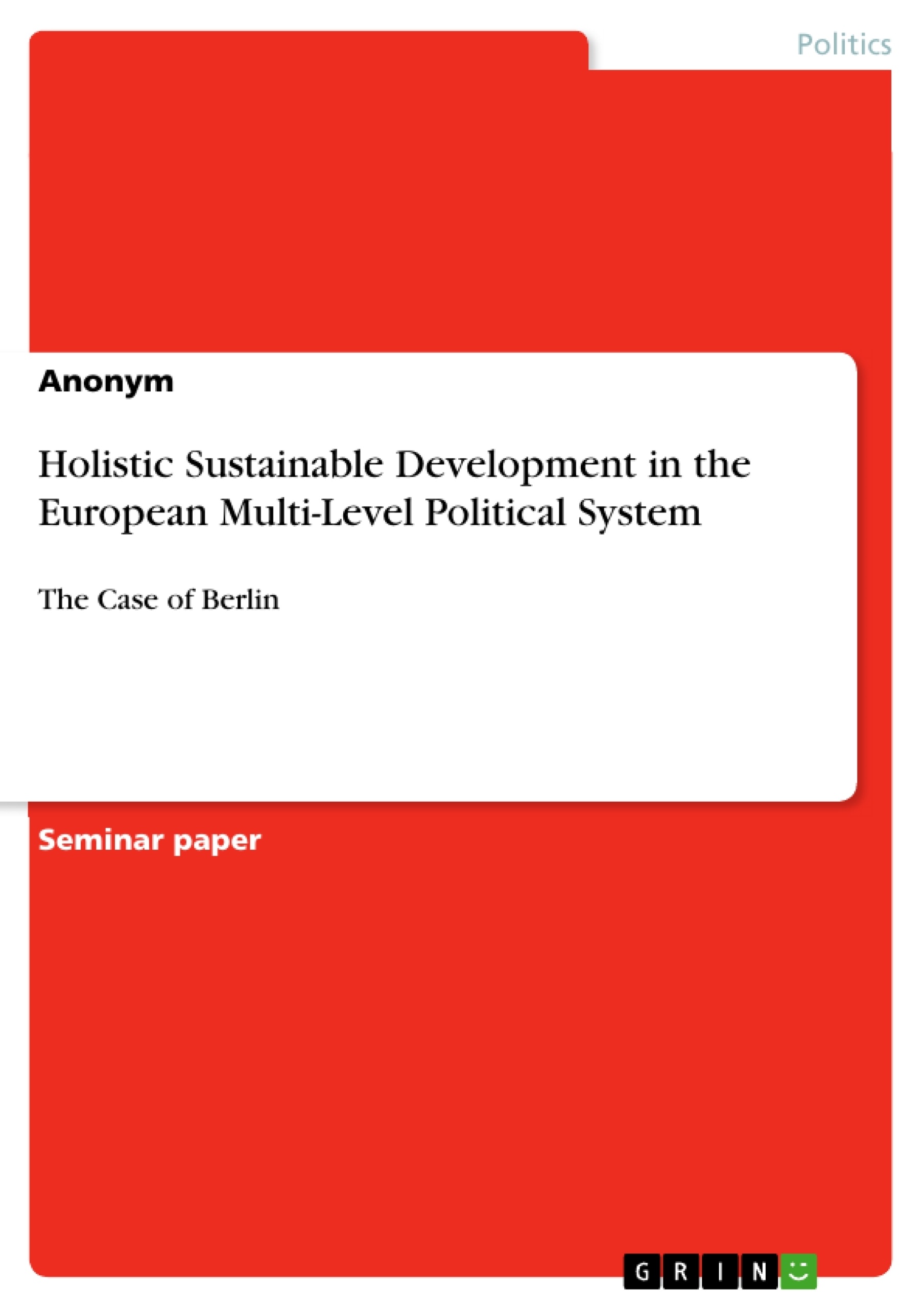The task of this assignment is an attempt to put Berlin's efforts into perspective and to examine Berlin's approach towards becoming a sustainable city from the point of view of a holistic understanding of sustainability.
In order to do so the assignment will start with the description of such a holistic conception, namely the so-called pillar-model, which comprises interlinked and interdependent dimensions or spheres of sustainable development - the economy, ecology, political institutions and social aspects. This chapter will combine the description of the model with a summary of two significant documents. Furthermore a special focus already has to be set on issues for sustainable development, that arise from multi-level systems of governance, by analyzing the competences and efforts of the European Union and the Federal Republic of Germany in the political field of sustainable politics - and the deductive obligations for Berlin. As I will demonstrate for the case of legislative principles in the European Union substantial shifts on the superordinate level may affect the local level in the implementation and the conception of one's own initiatives. Afterwards, I will present two initiatives of Berlin - Berlin's Local Agenda 21 and the Environmental Relief Programme (ERP). All of these programmes have to be put into perspective in my conclusion, whether one can talk about a genuine approach of the Land of Berlin, or if Berlin just complies with its obligations in the multi-level political system.
Throughout the assignemt I will follow the assumption, that Berlin is heavily bound by systematic obligations and financial constraints. In those areas, where the city finally designs and implements programmes, it is obliged to do so and to rely on financial support to conduct the initiatives, respectively this support is a significant incentive.
Inhaltsverzeichnis (Table of Contents)
- Introduction
- Dimensions of Sustainability
- The Brundtland-Report (1987)
- The Agenda 21 (1992)
- Sustainable Development in Multi-Level Political Systems
- The Federal Republic of Germany
- The Political System
- Sustainable Development and Political Parties
- The European Union - Sustainability and Competition
- The Federal Republic of Germany
- Sustainable Development in Berlin
- Berlin's Local Agenda 21
- Berlin's Environmental Relief Programme
- Conclusion
Zielsetzung und Themenschwerpunkte (Objectives and Key Themes)
This assignment aims to analyze Berlin's approach to sustainable urban development, focusing on the challenges and limitations of implementing sustainable development policies in a multi-level political system. The main objectives include:- Describing the concept of holistic sustainable development through the "pillar model," which includes economic, ecological, political, and social dimensions.
- Examining the influence of the European Union and the Federal Republic of Germany on Berlin's sustainable development strategies.
- Evaluating Berlin's Local Agenda 21 and Environmental Relief Programme (ERP) initiatives.
- Assessing whether Berlin's actions constitute a genuine approach to sustainable development or merely compliance with obligations in the multi-level political system.
Zusammenfassung der Kapitel (Chapter Summaries)
Introduction
This chapter introduces the topic of sustainable development in Berlin, highlighting the city's image as a hub for innovation and the "Green Economy." The chapter outlines the assignment's objective to critically evaluate Berlin's efforts towards sustainable development from a holistic perspective. It introduces the pillar model, which emphasizes the interconnectedness of economic, ecological, political, and social dimensions of sustainability. The chapter also briefly discusses the complexities of multi-level governance in relation to sustainable development, highlighting the impact of policies at the European and federal levels on Berlin's local initiatives.Dimensions of Sustainability
This chapter provides a theoretical framework for understanding the dimensions of sustainability by introducing two crucial documents: the Brundtland Report and Agenda 21. The chapter emphasizes the importance of a holistic approach to sustainable development, encompassing economic, ecological, social, and political aspects. It discusses the Brundtland Report's emphasis on the interdependent nature of these dimensions, where economic activities rely on social factors, environmental resources, and political institutions. The chapter also notes the significance of Agenda 21 as a foundation for local urban sustainability initiatives.The Brundtland-Report (1987)
This chapter delves into the Brundtland Report, its historical context, and its defining role in popularizing the concept of sustainable development. The chapter highlights the report's standard definition of sustainable development as meeting present needs without compromising future generations. It further emphasizes the report's call for integrated, cross-sectoral approaches to sustainability, encompassing environmental protection, economic growth, and social well-being.The Agenda 21 (1992)
This chapter will likely discuss the UN Conference on Environment and Development (Rio Summit) and the resulting Agenda 21 document. It may explore Agenda 21's impact on global sustainability efforts, particularly its role in inspiring the development of Local Agendas 21 around the world. The chapter might also touch on the shifting priorities within sustainability discourse, with a potential emphasis on the increasing prominence of economic concerns.Schlüsselwörter (Keywords)
Sustainable development, Berlin, multi-level governance, European Union, Federal Republic of Germany, Local Agenda 21, Environmental Relief Programme (ERP), pillar model, Brundtland Report, Agenda 21, Green Economy, holistic approach, economic, ecological, social, political, institutions, governance, policy implementation.- Quote paper
- Anonym (Author), 2013, Holistic Sustainable Development in the European Multi-Level Political System, Munich, GRIN Verlag, https://www.hausarbeiten.de/document/214652



